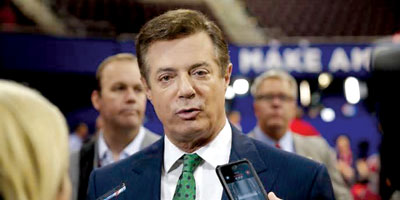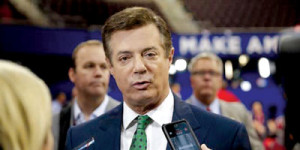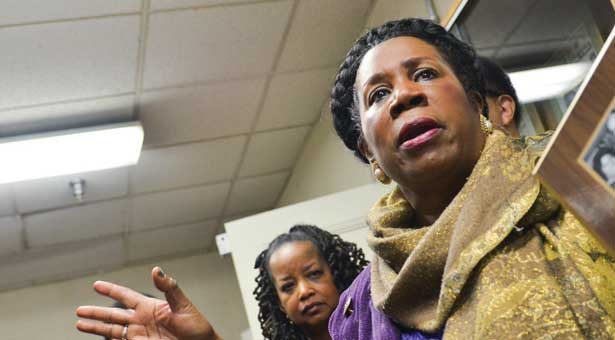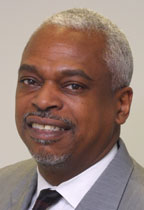

Paul Manafort’s ambition set the stage for his downfall
WASHINGTON — In February 2016, after decades of lucrative paydays from foreign clients, Paul Manafort found himself at an inflection point. He was starting to give up hope of collecting millions of dollars owed to him by a Russian-aligned Ukrainian political party, and was straining to help his son-in-law salvage bad real estate investments. And he was also itching for one last shot on the American political stage.
Over coffee at the Montage Beverly Hills hotel with an old friend, Thomas J. Barrack Jr., Mr. Manafort pursued an opportunity that he thought could solve his problems — joining Donald J. Trump’s presidential campaign. And Mr. Barrack, one of Mr. Trump’s closest advisers, agreed to help make that happen.
By the end of March, Mr. Manafort was on board, and in May, he was promoted to campaign chairman and chief strategist. Under Mr. Manafort’s direction, Mr. Trump secured the nomination, rallied much of the Republican Party establishment behind him and set the strategy that would take him to the White House. But instead of being a crowning achievement, the job that Mr. Manafort thought would turbocharge his consulting business set the stage for his downfall.
Although Mr. Manafort was forced out of the Trump campaign less than three months before Election Day, his suddenly high profile set off increased scrutiny of his foreign consulting work by congressional and law enforcement investigators. The investigations have left Mr. Manafort, 68, owing millions of dollars to his lawyers, according to people familiar with his defense, and led some friends and business partners to distance themselves from him.
And on Monday, the Justice Department’s special counsel, Robert S. Mueller III, charged Mr. Manafort and his longtime deputy, Rick Gates, with violating lobbying, tax and banking laws in an effort to hide more than $75 million in income from their work in Ukrainian politics. The charges stem from work performed by Mr. Manafort and Mr. Gates from at least 2006 to 2015 for Russia-aligned Ukrainian politicians and parties, including the one led by the former Ukrainian president Viktor F. Yanukovych.
“He could have kept running campaigns for the Yanukovychs of the world, and nobody would have cared,” said Hector T. Hoyos, one of Mr. Manafort’s closest friends and business partners. “But he took on the Trump campaign because he believed that the country was going down the wrong path, and he wanted to make a difference,” Mr. Hoyos said of Mr. Manafort, who is the godfather of Mr. Hoyos’s daughter.
Had things not gone south, Mr. Hoyos said, “it would have been a huge business windfall for Paul.”
“When you’re a kingmaker,” he said, “everyone wants to get close to you. That wasn’t the main reason that he got involved and decided to run the campaign, but that was in the back of his mind.”
Nonetheless, Mr. Manafort “is not regretful of joining the Trump campaign,” said Mr. Hoyos, who spoke with his friend on Saturday. “He is regretful of doing the work he did in Ukraine.”
Mr. Manafort first made his name in politics as a swashbuckling young Republican operative on the presidential campaigns of Gerald R. Ford and Ronald Reagan. But his work outside of electoral politics is where he really made his mark — and his fortune.
He and two young colleagues from Mr. Reagan’s campaigns — Charles R. Black Jr. and Roger J. Stone Jr. — formed the core of a new breed of consulting and lobbying outfit that parlayed campaign-forged connections into big contracts from American businesses and foreign interests seeking to curry favor with the Reagan administration.
STOP AND SEND TO THE WWEB
In this shadowy world of international political consulting, Mr. Manafort, Mr. Gates and other Americans have earned vast sums working for clients tainted by corruption or authoritarianism or whose interests sometimes do not align with those of the United States, including Ferdinand Marcos of the Philippines and Mobutu Sese Seko of the Democratic Republic of Congo.
For much of the last decade, Mr. Manafort’s work focused on Ukraine. He is credited with resurrecting the career of Mr. Yanukovych, and selling him to the West as a pragmatic leader who could bring the country into the European Union. But Mr. Yanukovych’s government crumbled in 2014 when he fled to Russia after his security forces clamped down violently on street protests over his government’s corruption and pivot toward Moscow.
Even after Mr. Yanukovych fled, Mr. Manafort continued consulting for a Russia-friendly party called Opposition Bloc, which emerged from the ashes of Mr. Yanukovych’s government. Around the same time, Mr. Manafort began taking out loans on properties that Monday’s indictment alleges were purchased using money laundered through overseas accounts from his Ukraine work. He appears to have used at least some of the money to try to salvage real estate investments spearheaded by his son-in-law Jeffrey Yohai.
“Paul had used the bulk of his cash to bail out the situation that his son-in-law created, so he had to borrow a lot against his properties,” Mr. Hoyos said.
Nonetheless, Mr. Manafort seemed eager to return to the bright glare of the American political spotlight — even if it meant working for Mr. Trump for free, as he promised Mr. Trump in a memo delivered to the candidate’s family by Mr. Barrack.
In the memo pitching his services to Mr. Trump, Mr. Manafort cited as selling points the fact that he owned an apartment in Trump Tower in Manhattan, where the campaign was headquartered, and his lobbying firm’s work for Mr. Trump in the 1990s, when it pushed to change the flight path of planes flying over Mr. Trump’s Mar-a-Lago club in Palm Beach, Fla.
And Mr. Manafort cast his international work as a strength, while spinning his two-decade absence from American politics as proof that he would “not bring any Washington baggage” to a campaign that was channeling anti-establishment fervor.
Mr. Trump and Mr. Manafort quickly developed a rapport on the campaign trail. Mr. Trump and his family came to view the veteran operative as a valuable resource on a wide range of subjects on a campaign that had been run to that point by younger, less experienced operatives.
For his part, Mr. Manafort relished being back in the white-hot center of American politics, according to his associates. But it was not long before he was engaged in a bitter power struggle with Mr. Trump’s first campaign manager, Corey Lewandowski. Within a month of Mr. Manafort’s arrival, Mr. Trump elevated him above Mr. Lewandowski, who was later fired, giving Mr. Manafort authority to hire his own team and increase the notoriously frugal campaign’s spending on advertising and field organizing.
Mr. Manafort brought on a number of his former associates in senior roles. Some — such as Mr. Gates, the operative Michael Caputo and the pollster Tony Fabrizio — also had experience working in Ukraine or other former Soviet states, and have since drawn scrutiny from the news media or from congressional and law enforcement investigators examining Russia connections.
But things quickly went south for Mr. Manafort when news outlets began investigating his work and associations in Ukraine.
When The New York Times published an exposé revealing that a ledger from Mr. Yanukovych’s party listed $12.7 million in off-books cash payments earmarked for Mr. Manafort’s company, Mr. Manafort argued to others in campaign leadership that the story was ginned up by allies of Hillary Clinton, the 2016 Democratic presidential nominee, and would blow over.
Some campaign officials wanted to keep Mr. Manafort on board, but Stephen K. Bannon, who had recently been brought on as the campaign’s chief executive officer, told Mr. Manafort “this is bad,” and told Mr. Trump “that guy has to go.”
Within days of the article — as well as contemporaneous exposés by other news outlets on Mr. Manafort’s activities and associates in Ukraine — Mr. Manafort was forced off the campaign.
Mr. Manafort continued talking strategy with top campaign officials through Election Day, though, according to campaign officials. And, in the days before Mr. Trump’s inauguration, he called Mr. Trump’s chief of staff, Reince Priebus, to repudiate a dossier of memos written by a former British intelligence officer that mentioned him.
The dossier alleged that Mr. Manafort managed “a well-developed conspiracy of cooperation” between the Trump campaign “and the Russian leadership,” and that Mr. Yanukovych had informed President Vladimir V. Putin that he ordered “substantial kickback payments” to Mr. Manafort.
Those claims were “garbage,” Mr. Manafort told Mr. Priebus, according to someone familiar with the call.
Yet even as the investigations of his activities heated up, Mr. Manafort continued to solicit international business. In recent months, associates say, he traveled to Ecuador; Dubai, in the United Arab Emirates; and Iraqi Kurdistan, among other places, and did little to discourage the perception that clients and potential clients could stand to benefit from his connections to Mr. Trump.
Some clients, such as the allies of the leader of Iraq’s Kurdish region who hired Mr. Manafort to help administer and promote a referendum on Kurdish independence from Iraq, were not dissuaded by the investigations and his sudden notoriety.
But after it was revealed that Mr. Mueller’s agents had executed a pre-dawn raid on Mr. Manafort’s home in July in Alexandria, Va., he became toxic to prospective business partners, according to Mr. Hoyos.
“People were hesitant to be exposed to the fallout that was happening around Paul,” Mr. Hoyos said. “They didn’t want that to tarnish their image in the United States and around the world.”
Mr. Hoyos said he had brought Mr. Manafort into a number of business ventures, including with a Chinese construction billionaire and a Chinese government-owned investment fund, but he informed Mr. Manafort in recent weeks that he needed to end their business relationship.
“He was really, really sad, but he understood,” Mr. Hoyos said. “He apologized to me, and said, ‘I’m sorry that I created all these problems for you.’”
The last months have also strained Mr. Manafort’s family. His older daughter has filed divorce from Mr. Yohai, while his younger daughter was questioned by a potential employer about whether the payments from Ukraine could be traced back to her, though she ultimately was hired.
Mr. Hoyos said that Mr. Manafort’s daughters and their mother, Kathleen Manafort, who has been married to Mr. Manafort for nearly 40 years, are rallying behind him.
“They want their father to be around when their kids grow up,” Mr. Hoyos said, “and that is very much in doubt.”
Glenn Thrush contributed reporting from Washington, and Nicholas Confessore from New York.





Be the first to comment